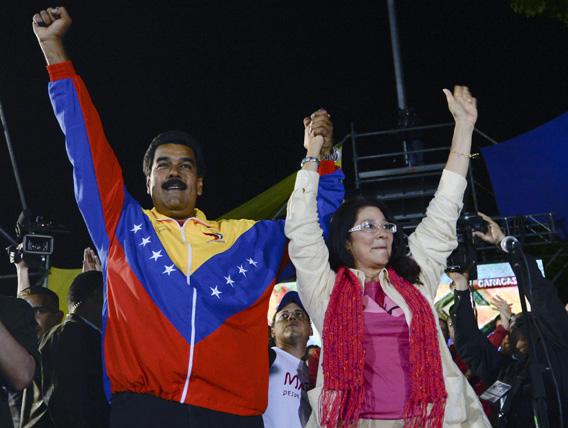A few weeks before the April 14 election, in a state-supported home appliance factory, future president-elect of Venezuela Nicolás Maduro played a video of Hugo Chávez extolling his plans to construct a new facility as he scribbled notes on a map. “Here we have in our hands the same map that Comandante Chávez was working with that day,” Maduro said, holding up the map. “You can see here the dots and the circles for the construction of these factories. He left us the calculations; he left us everything.”
The episode perfectly illustrated Maduro’s primary promise to Venezuelan voters: His government will execute Chávez’s plans. To tap into the emotional outpouring following Chávez’s death in March, Maduro put the former president’s image on nearly everything except the ballot itself. He proclaimed himself “Chávez’s son” and said he felt “connected to Chávez’s soul.” He even declared that El Comandante had appeared to him in the form of a tiny bird while he was praying.
On Sunday Maduro defeated his opponent, Henrique Capriles Radonski, in an unexpectedly narrow race. Election authorities announced that with more than 99 percent of the vote counted, Maduro won 50.6 percent to Capriles’ 49.1 percent. Citing 3,200 irregularities in the voting, Capriles has refused to recognize the results and is demanding a recount. Chavismo’s control of the country’s institutions, in particular the election commission and the courts, makes it hard for the opposition to challenge the results. Still, this was not the victory that Maduro hoped for. The razor-thin margin undermines the new president’s ability to govern a crisis-ridden Venezuela, let alone hold his own party in check. Indeed, given how much the playing field favored Chávez’s heir, Sunday’s election results can be read as the beginning of the end for Chavismo.
How tilted was the playing field? Take the National Electoral Council. After Chávez’s death, the council decided the official presidential campaign would last only 10 days and each candidate would be allowed just four minutes of airtime daily. That decision meant that the opposition had less than an hour of television time for the entire campaign, while the government was allowed those same four minutes plus an additional 70 minutes per channel per week for “institutional” broadcasts. During the Chávez era, those broadcasts had already become indistinguishable from electoral ads. For Maduro, it was no different: Many centered on his approval of massive spending for public works at nearly every campaign stop.
In fact, access to media was probably Maduro’s strongest advantage. Monitoreo Ciudadano, an electoral watchdog, calculated that between April 2 and April 12, coverage of Maduro’s campaign events by state-owned Venezolana de Televisión added up to more than 70 hours. In contrast, coverage of Capriles by the same TV channel totaled 23 minutes. The disparity wouldn’t be so alarming if independent media had compensated for the imbalance. But important private media outlets have been neutralized through government harassment, heavy fines, and the threat of closure. On top of this, like Chávez, Maduro relied heavily on cadenas, a legal mechanism compelling all TV and radio stations to broadcast the president’s messages simultaneously at any time for however long he speaks. According to Monitoreo Ciudadano, Maduro’s cadenas averaged 26 minutes a day during the last month, totaling more almost nine hours.
And the abuse of state resources was not limited to public media. The opposition was nearly broke, carrying nearly $1 million in debt from the last election and unable to raise money because of government harassment of its donors. Meanwhile, Maduro enjoyed the full backing of the state apparatus, including the government’s oil-rich slush funds. State vehicles and employees were used for campaign events and for mobilization of supporters; public money went to campaign expenditures. In previous elections PDVSA, the national oil company, helped mobilize volunteers by providing cash, transportation, and food; the oil company even paid for supporters’ nannies so they could vote. This time the unofficial became official: Maduro named PDVSA’s president and the minister of energy, Rafael Ramírez, the head of his get-out-the-vote campaign.
Finally, there’s the military. According to a document leaked last month, the government planned to use the militias and the People’s Guard for the voter mobilization drive on Election Day. The document surprised no one since the military already had made its intentions clear. The day after Chávez died, Defense Minister Diego Molero said the armed forces would not fail Chávez. “Once elections are organized, we will honor his wishes and we will give the fascists a tough blow,” he said.
Maduro inherits a country in crisis. Venezuela has among the world’s highest inflation and crime rates, a massive fiscal deficit, and skyrocketing debt—even though it enjoyed its largest oil windfall ever during the Chávez era. It suffers from worsening power outages, crumbling infrastructure, and severe food shortages. The macroeconomic situation is so grave that Maduro was forced to devalue the currency twice before the election to improve the government’s balance sheet. Some forecasters are predicting the economy will contract and the inflation rate will hit 30 percent before year’s end. Consumption and government spending are bound to fall. Poverty will increase.
Had Maduro won with a comfortable margin—something close to the 11-point margin Chávez won over Capriles last October—he would still face steep challenges. Now he enters office with a weak mandate and contested legitimacy. If there is any consolation for the Venezuelan opposition, it is that Chavismo will probably pay the political price for the irresponsible economic policies of the past 14 years. But as the crisis worsens, government supporters will not point to Chávez as the main culprit, although he surely deserves the responsibility. They will blame the man who just narrowly won a highly unfair election. Ironically, Chávez supporters may soon castigate Maduro as the president who botched the Comandante’s best-laid plans.
